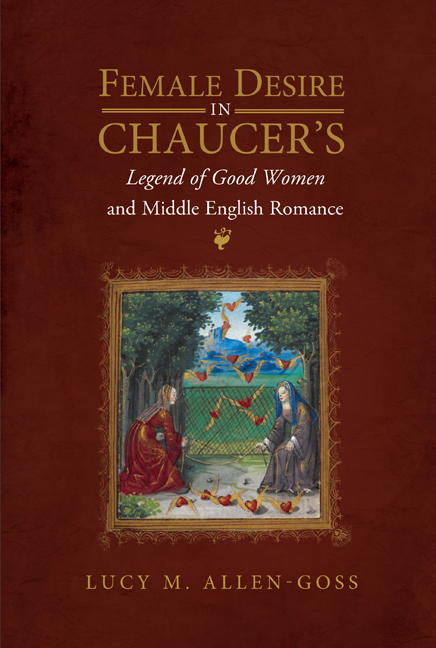Book contents
- Frontmatter
- Contents
- Acknowledgements
- Abbreviations
- Author’s Note
- Introduction: The Origins of Female Desire
- 1 The Silencing of Female Desire in the ‘Legend of Philomela’
- 2 The Traumatised Narrative of the Alliterative Morte Arthure
- 3 ‘As Matter Appetiteth Form’: Desire and Reciprocation in the ‘Legend of Hipsiphyle and Medea’
- 4 Stony Femininity and the Limits of Desire in The Sowdone of Babylon
- 5 Veiled Interpretations and Architectures of Desire in the ‘Legend of Thisbe’ and the ‘Legend of Ariadne’
- 6 Opening Mechanisms, Enclosing Desire: The Erotic Aesthetics of Undo Your Door
- Conclusion: The Ends of Desire
- Bibliography
- Index
- GENDER IN THE MIDDLE AGES
Conclusion: The Ends of Desire
Published online by Cambridge University Press: 16 September 2020
- Frontmatter
- Contents
- Acknowledgements
- Abbreviations
- Author’s Note
- Introduction: The Origins of Female Desire
- 1 The Silencing of Female Desire in the ‘Legend of Philomela’
- 2 The Traumatised Narrative of the Alliterative Morte Arthure
- 3 ‘As Matter Appetiteth Form’: Desire and Reciprocation in the ‘Legend of Hipsiphyle and Medea’
- 4 Stony Femininity and the Limits of Desire in The Sowdone of Babylon
- 5 Veiled Interpretations and Architectures of Desire in the ‘Legend of Thisbe’ and the ‘Legend of Ariadne’
- 6 Opening Mechanisms, Enclosing Desire: The Erotic Aesthetics of Undo Your Door
- Conclusion: The Ends of Desire
- Bibliography
- Index
- GENDER IN THE MIDDLE AGES
Summary
This book seeks to contextualise the hermeneutic construction of women’s bodies as dangerous and unstable conduits to the expression of deviant desire. I argue that Chaucer's Legend and the Middle English romances explore the possibility of a feminine hermeneutic that considers how differently language might work if we contemplated the possibility of women speaking their desires. In the Legend, this feminine hermeneutic is a nightmarish possibility, in which woman's expressions of desire function as monstrous prostheses, failing to articulate or signify, and simultaneously rendering the bodies they supplement grotesque and deviant. By contrast, the feminine hermeneutic of the romances functions as a technological prosthesis, equipping female characters with new, innovative mechanisms through which they may express and structure their desires. These two representations of feminine hermeneutics are not purely and simply polar opposites, the one negative and pejorative, the other positive and affirming. The Legend, even as it constructs female desires as irrevocably deviant in their articulation, also necessarily constructs a space in which those desires are articulated. It affords them visibility and substance, however circumscribed by censure. The romances, meanwhile, rely upon a surrogacy of embodied desire, constantly using male bodies to ventriloquise female emotions, and thus they insinuate that female emotion is only truly visible, truly palpable, when articulated by and through men. The tensions within these differing attempts to construct a feminine hermeneutic shed light on interpretative practices in a wide sense. In this conclusion, I use the Legend and the romances read both backwards and forwards across hermeneutic traditions. I re-situate the Latin hermeneutics of Jerome and the work of Jean de Meun in relation to an English fourteenth- and fifteenth-century intervention that makes visible the female desires so often left out of consideration. I also seek to reinterpret our own practices as medievalists working on medieval texts, and on medieval women, their embodied desires and emotions.
THE FAILED ENDS OF THE LEGEND's WOMEN
My reading of Chaucer's Legend locates that text within a complex hermeneutic tradition stretching from Jerome's patristic Latin to Jean de Meun’s influential vernacular poetics. There the feminine is coded as a blank space, a tablet to be inscribed or a body to be impregnated. This works to displace or occlude female desires and emotions, to render them rhetorically null. She who has no agency has no desires worth considering.
- Type
- Chapter
- Information
- Publisher: Boydell & BrewerPrint publication year: 2020



